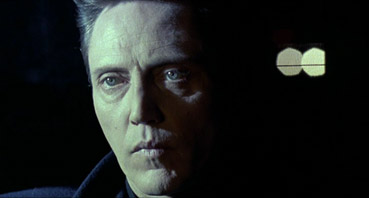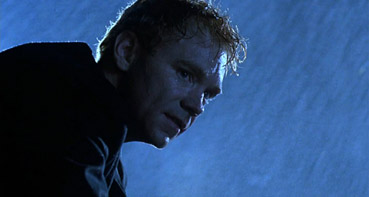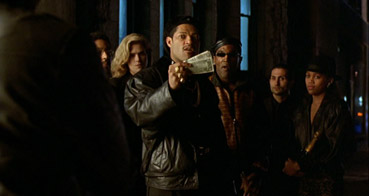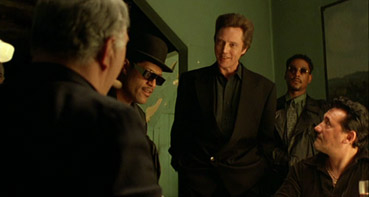|
If you're looking for a one-person definition of the outsider filmmaker then Abel Ferrara should definitely be high up on the shortlist. A resolutely independent director, his films don't so much push the conventions of his various genres in which he works as grab them by the scruff of the neck, throw them against the wall and piss on them. These are sometimes dark and even dangerous movies, films that are guaranteed to annoy and occasionally offend those who prefer their characters likeable and their stories told in a clean and tidy manner. His 1996 The Funeral stripped the Italian gangster movie of its Godfather glamour, The Addiction (1995) linked vampirism to urban decay and genocide, and the superb Bad Lieutenant (1992) took the concept of the corrupt city cop to an deeply disturbing but unforgettable extreme.
King of New York is an urban gangland thriller whose central character is possibly the most iconic in all of Ferrara's cinema. The director apparently conceived the role of Frank White (the script was actually written by long-term Ferrara collaborator Nicholas St. John) specifically with Christopher Walken in mind, an actor who at this point he had never met, and had Walken not taken the role then the film would not have been made. It's easy to see why. Walken is at the peak of his game here, a walking beacon of criminal cool and restrained malevolence, whose every word is laced with danger and whose sudden explosions of fury can be startling.

The film opens with Frank being released from jail, and he wastes no time in hooking up with old partner Jimmy Jump (a hugely enjoyable, larger-than-life performance from Larry Fishburne – his reunion with Frank is priceless) and re-establishing the sort of underworld power base that presumably landed him in the pokey in the first place. Flanked by a beautiful female entourage that includes glamorous Park Avenue attourney Jennifer, and protected by a unit of hedonistic, trigger-happy warriors, he is the essence of the amoral modern capitalist, for whom the continual accumulation of wealth by any means is an end in itself, and if that means wiping out a rival gang to take their drugs or their business then so be it. That he appears to have a social conscience regarding the poor of his own community can't help but come across as self-serving and ultimately hypocritical, given that a fair proportion of those who will make use of the hospital he is so keen to keep open will do so as the result of the drugs he is getting rich on or the violence that goes hand-in-hand with their distribution.
Although much of this may seem familiar now, back in 1990 Ferrara was treading on new and sometimes uncomfortable ground. The film's up-front depiction of both the glamour and the extreme violence that comes with big-time drug racketeering, and its posing and image-conscious black gangstas were an opening cannonade in a sub-genre that was soon to find a sizeable audience with the success of films like New Jack City (1991) and Menace II Society (1993). This is not violence dressed up in codes of honour or family loyalties, but brutal and messy, as much as a statement of power as it is tactical or defensive. Gun battles can erupt in the middle of a drug deal or out in the street; at one point gunshots are used as sentence punctuation after Frank has executed a rival gang leader, shooting bullets into the body to emphasise his open-arms offer to the survivors to join him. Frank's strength is that he ignores social and racial barriers and will recruit anyone he thinks might be useful to his operation, from experienced Italian mobsters to lowly street punks. His weakness is that he starts to believe his own press and becomes convinced that he really can go up against anyone and come through unscathed, whether it be gangland rivals or the establishment and its representatives.

Although Walken's considerable charm and screen presence assures that audience allegiance is with Frank from the off, the film deviates from the norm by intermittently and unexpectedly switching our sympathies to the opposing side, represented by hot-headed detectives Gilley and Flanigan and the more seasoned and level-headed Bishop. Initially they come across as three musketeers of self-righteous vengeance, cops with an attitude and a serious grudge against our boy, but as the story progresses and we are offered a glimpse of the off-duty men behind the badges and bear witness to the violent chaos that results from Frank's activities, you start to realise that they may have a point. These are not men hell bent on personal vengeance, but cops outraged by a criminal who scorns everything they stand for, whose power is so great that he has become almost untouchable, at least through legal channels. This audience-police bond, though disconcertingly uneven, is formed so effectively through the savvy casting of established character actor Victor Argo as Bishop and stars-to-be David Caruso and Wesley Snipes as Gilley and Flanigan, now-familiar faces that retrospectively provide an accelerated route to character connection. When we're with the detectives it's clear that Frank is indeed dangerous monster, but he's OUR dangerous monster and a charismatic one at that, and despite our sympathy with the detectives' collective frustration, it's a tough loyalty to break.
King of New York may not be Ferrara's most extreme film or seem like his most rule-breaking, but this is partly due to the overshadowing effect of some of the more financially successful and widely seen genre films that followed in its wake (New Jack City was the highest grossing independent feature film of 1991, making five times its budget on home turf cinema tickets alone). But it's a still seriously kick-ass crime movie, stylishly shot and explosively performed by a cult cast to die for (it's even got Steve Buscemi as the only white guy on Jimmy Jump's crew), and as fresh and enjoyably edgy as any film in the director's oeuvre.
A decent enough 1.85:1 anamorphic transfer that shines in the daytime exteriors but slips a bit when there are areas of single colour (twilight skies, etc.), when compression artefacts and the odd trace of banding can be seen. Upscaling to HD really exaggerates this. The colours are strong, though, accurately reproducing the vivid gold and blue tints used in some scenes (done by gelling the lights rather than in post-production, Abel informs us on his commentary), and the detail is generally good. The entire 2-disc set is largely a port of the Lion's Gate US 2-disc special edition from 2004, but the print here does appear to be an authentic PAL transfer rather than an NTSC conversion – there are no double images on freeze frames and the running time is correspondingly shorter as a a result of the PAL speed-up. Running the two side-by-side, however, I'd have to give the Lion's Gate transfer the edge on sharpness, but only just.

Both Dolby 2.0 stereo and 5.1 soundtracks are offered, but don't be fooled into thinking the latter is a new remix, because it isn't. This is one of those AC3 recodes of a stereo track that does indeed produce a fuller and louder sound, but with the unfortunate side-effect of randomly placing sound effects to the rear that have no place being there. I thus preferred the stereo track, despite its more restricted dynamic range and a more accentuated background hiss, which gets quite bad at one point and is even joined by a bit of crackle. It's a solid enough track in other respects, but the budget does show here.
Abel Ferrara Commentary
A wild, occasionally incomprehensible but enjoyably one-of-a-kind commentary by the director, who is kept in some sort of check by Mark Rance, producer of the below-detailed documentary A Short Film About the Long Career of Abel Ferrara. Given Ferrara's twitchy and growling mode of speech, it's hard to tell if he's drunk or not, but it does intermittently seem that way and the sound of bottles being opened can be heard on at least three occasions. Interesting background and technical information is supplied, but there are a few times when you suspect Ferrara is playing the prankster provocateur, contradicting the claims of others regarding the improvisational work of the cast ("Get bent! They didn't improvise dick in this film!") and mocking the idea that it's in any way realistic ("This is a movie based on other movies, this isn't a movie based on real life"). He also claims he wouldn't make a movie like this again if you put a gun to his head. He drools over the women, describes Walken as "the coolest motherfucker," and can suddenly laugh out loud for reasons that are rarely explained. He even growls out a song over the closing credits. Twitchy and excitable, it's like watching the movie with the director halfway through a heroic booze-up – how much you enjoy it may depend on how attractive a prospect that is for you. I'm certainly up for it.
Filmmaker Commentary
Composer Joe Delia, producer Mary Kane, editor Anthony Redman and casting director Randy Sabusawa recall the making of the film in a more traditional and coherent fashion than the director himself, providing a lot more background detail and directly contradicting some of Ferrara's (probably mischief-making) claims regarding improvised scenes and dialogue. Lively but occasionally self-congratulatory, as a companion to the film it's a lot more informative than Abel's, but not as engagingly demented or as much fun.
Interview with producer Augusto Caminito (19:30)
A useful interview with the film's Italian producer, who outlines his involvement and discusses working with Ferrara, who despite his difficult reputation he never had a problem with. Some interesting background information on the filming is provided, though much is duplicated in the commentaries. Caminito does intriguingly suggest that had the film had an American producer then it wouldn't have been made at all, at least in a form close to what Ferrara had envisioned.

A Short Film About the Long Career of Abel Ferrara (47:04)
A busy and entertaining look back at Ferrara's career through interviews with many of his regular collaborators, with all of his features up until 2001's 'R Xmas touched on and The King of New York covered in a little more detail than the others. Shot on mini-DV and laid back in its approach – four of the contributors share stories together, DoP Ken Keisch wanders through the woodland around his home – it feels a lot shorter than that running time suggests and there are enough amusing and eye-opening stories here to make you wish we could have spent a lot longer on each of the films. Really good stuff, but it needed to run for twice this length, and it would have been nice to hear from the man himself.
The Adventures of Schoolly D: Snowboarder (42:11)
A bit of a stretch as a film extra, it's inclusion is justified because Abel Ferrara likes the man's music and used two of his tracks in the movie. Basically a 40-minute hang loose with Jesse B. Weaver, Jr, aka gangsta rapper Schoolly D, who takes us through his youth, influences and professional career, bookended by an infuriatingly edited intro and round-up from Alan Light. Weaver is surprisingly engaging, though does say "you know what I'm saying?" about three times a minute.
Abel Ferrara: Not Guilty (80:36)
An episode of the French cineaste TV series Cinéma du notre temps and directed by Rafi Pitts, who went on to make the compelling feature It's Winter. Rather than interview the director, Pitts and his crew hang out with him for a night, right through to the following morning. If you're after confirmation of Ferrara as a movie industry outsider then look no further – during the course of the evening we accompany him as he rides and walks the city streets, tells tall tales to girls who ask what they're filming, unexpectedly hops out of a cab and grabs a ride on the back of a motorbike, directs a video shoot, bangs out tunes on a piano and a guitar, is refused entry to a restaurant, has dinner with three of the actors from King of New York (Victor Argo included), watches extracts from his ill-fated William Gibson adaptation New Rose Hotel (1998) with actress Echo Danon, auditions and rehearses actresses, and a whole lot more. It certainly gets us almost intimately close to Ferrara, who comes across half inspired genius and half hyperactive madman, and contains some utterly fascinating and even entertaining stuff. Unlike the above documentary on the director, however, this one does go on a bit and could probably have survived some serious trimming.
Hollywood Superstars: Christopher Walken (26:02)
A lightweight and rather cheesy career biopic of Walken from a the Hollywood Superstars TV series in which interesting interviews with the man himself are intercut with stills and film extracts, driven along by a very British voice-over and a gushing score.
Not a popular film with those who like their gangster movie slick and deeply meaningful, King of New York has nonetheless achieved cult status and is a damned fine example of an outsider genre movie. It's rough around the edges and suggests a narrative depth that it doesn't really possess, but is also energetic and street-smart and wears its natural cool like a tailored cashmere coat. This 2-disc edition has taken a surprising four years to cross the Atlantic, and there's a good chance fans will have bought the Lion's Gate release some time ago (I know I did). If you didn't then, gripes about the 5.1 track and picture imperfections aside, this Arrow release is worth grabbing.
|